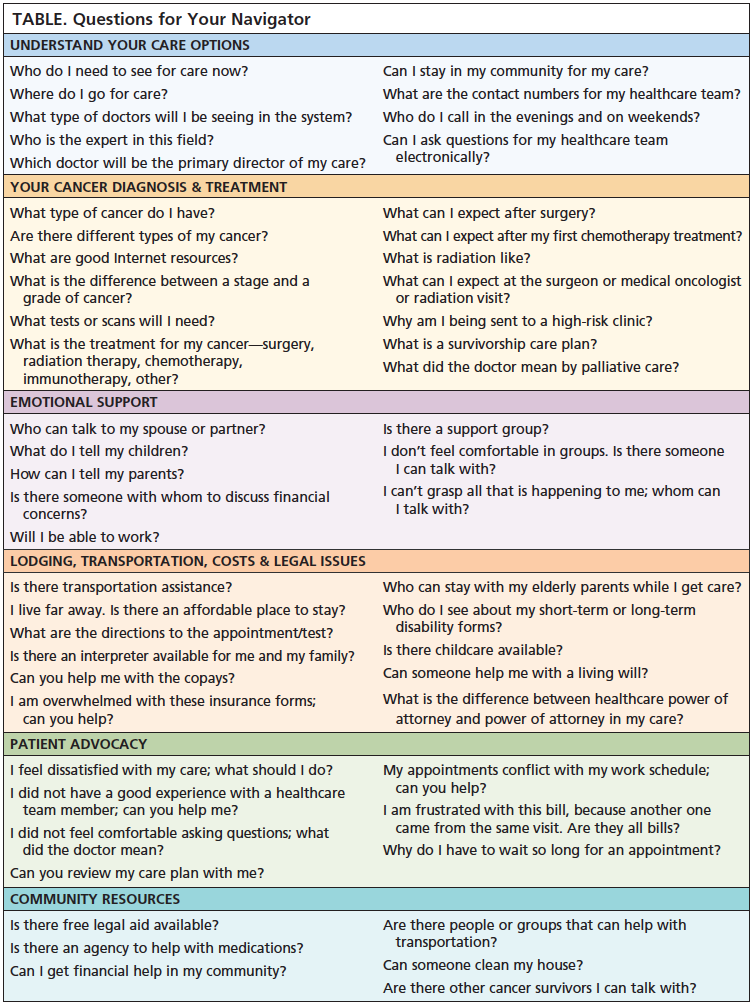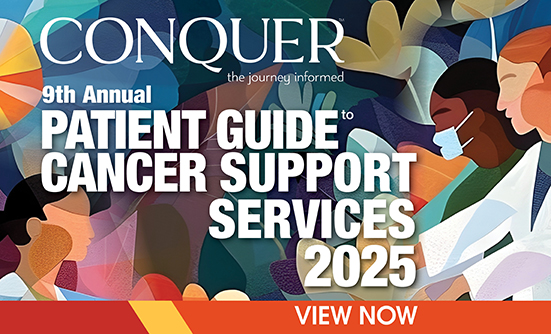In addition to the recent advancements in cancer screening and treatments, the role of patient navigation has expanded and has become a widely accepted concept as a health delivery support strategy. Your navigator is constantly learning the latest standards of cancer care.
According to the Academy of Oncology Nurse & Patient Navigators, having a navigator helps patients with cancer to overcome barriers to most appropriate care. It gives patients access to quality medical and psychosocial care from the time of a cancer diagnosis through all the phases of their cancer care and survivorship.
Navigators have different functions and roles within the healthcare system during screening, diagnosis, treatment, and survivorship—in large institutions or in smaller community cancer centers.
How Will the Navigator Help Me?
Think of your navigator as a seamless thread that weaves you, the patient, the healthcare system, and all its resources, together. Your navigator will help you travel through your personalized care within the complex healthcare system. Your navigator is your primary point of contact and works with other members of the care team to coordinate your care.
This critical person assists with identifying challenges to cancer care for the individual patient, and using local or national resources, your navigator will identify potential solutions through discussions with you and with your family.
The navigator also helps to address any special needs you may have and helps to prioritize questions about your treatment options, helping you to use time effectively with the different healthcare providers.
The Table lists the type of questions or concerns you may want to share with your navigator, who will help you to understand the care you are getting, or may need to get later on, as well as any other concerns you may have.
The navigator works with professional colleagues, including social workers, doctors, and nurse navigators, to provide psychosocial and community support.
Patient and Nurse Navigators
A patient navigator is an individual who does not have or use clinical training to provide individualized assistance to patients and families affected by cancer to improve access to healthcare services.
Patient navigators do have background knowledge of cancer care and resources and work within the healthcare system to decrease barriers to care, direct you to or provide educational resources, and offer consistent psychosocial support to the patient and his or her family.
The nurse navigator is trained in the application of clinical information and is responsible to identify and address any barriers to timely and appropriate cancer treatment for patients. This person has the appropriate medical background needed to ensure that you get the best care for you and is a critical member of the multidisciplinary cancer team.
Either the patient navigator or the nurse navigator will guide you through the full scope of cancer care—from diagnosis through survivorship.
Specifically, your nurse navigator will act as a central point of contact for you and will coordinate all the components involved in your cancer care, including surgical care, medical care, and radiation oncology care; social workers; medical information; community support; financial and insurance assistance; and any issues you may experience during your cancer care.
In general, your navigator can help to get you where you need to get during the cancer experience and can proactively describe the situations or experiences you will come across along the way as a patient with cancer. All navigators view the healthcare system through the eyes of the patient.
Your navigator is aware of the treatment you will experience as part of your care, and the community resources that can support you and your family. Your navigator will communicate with your full care team and coordinate your care on your behalf to ensure you get the best treatment and care for your specific situation.
Communicating with Your Navigator
So how can you, as a patient, work with a navigator? First and foremost, be honest with your navigator, so he or she can make appropriate referrals to enhance your care. If navigators don’t know the answer to something, they will direct you to another team member who does. Navigators have a defined role, and they will transition you to other healthcare team members, as needed.
Your navigator may contact you during a personal office visit or by a telephone call. The navigator will help you to become empowered and to experience a sense of control over your cancer, as you progress through the diagnosis and treatment.
This article is an updated version of an article published in CONQUER magazine in April 2018.
Key Points
- A patient navigator is your primary point of contact and works with other members of the care team to coordinate your care
- A nurse navigator is a clinically trained individual responsible to identify and address barriers to timely and appropriate cancer treatment
- This person has the appropriate medical background needed to ensure that you get the best care for you
- Be honest with your navigator, so he or she can make appropriate referrals to enhance your care
Patient Resources
Academy of Oncology Nurse & Patient Navigators
www.aonnonline.org
American Society of Clinical Oncology
https://am.asco.org/value-patient-navigators-members-multidisciplinary-oncology-care-team
CONQUER magazine
www.conquer-magazine.com/issues/2015/vol-1-no-1-february-2015/376-what-is-a-navigator
















